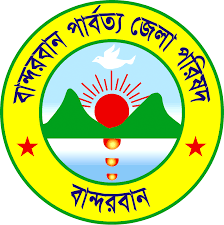
The Chattogram Hill Tracts, often shortened to simply the Hill Tracts and abbreviated to CHT, are group of districts within the Chittagong Division in southeastern Bangladesh, bordering India and Myanmar (Burma). Covering 13,295 square kilometres (5,133 sq mi), they formed a single district until 1984, when they were divided into three districts: Khagrachari District, Rangamati Hill District, and Bandarban District.

The Shanti Bahini was the armed wing of the Parbatya Chattagram Jana Samhati Samiti in Bangladesh. It is considered an insurgent group in Bangladesh. The Shanti Bahini was made out of mostly members from the Chakma tribe.

The Parbatya Chattagram Jana Samhati Samiti is a political party formed to represent the people and indigenous tribes of the Chittagong Hill Tracts in Bangladesh. Since its inception in 1972, the PCJSS has fought for autonomy and the recognition of the ethnic identity and rights of the indigenous tribes of the Hill Tracts. Its military arm, the Shanti Bahini was used to fight government forces and Bengali settlers in the Hill Tracts. A peace accord was signed in 1997 led to the disarmament of the Shanti Bahini and enabled the PCJSS to return to mainstream politics.
1997 (MCMXCVII) was a common year starting on Wednesday of the Gregorian calendar, the 1997th year of the Common Era (CE) and Anno Domini (AD) designations, the 997th year of the 2nd millennium, the 97th year of the 20th century, and the 8th year of the 1990s decade.
Manabendra Narayan Larma, also known as M.N. Larma, was a Jumma Chakma politician and Member of Parliament of Bangladesh. A leading proponent of the rights of the people of the Chittagong Hill Tracts, he was the founding leader of the Parbatya Chattagram Jana Samhati Samiti and its armed wing, the Shanti Bahini.
The Chittagong Hill Tracts Peace Accord also known as Chittagong Hill Tracts Treaty, 1997 is a political agreement and peace treaty signed between the Bangladeshi Government and the Parbatya Chattagram Jana Sanghati Samiti, the political organisation that controlled the Shanti Bahini militia on 2 December 1997. The accord allowed for the recognition of the rights of the peoples and tribes of the Chittagong Hill Tracts region and ended the decades-long insurgency between the Shanti Bahini and government forces.

Jyotirindra Bodhipriya Larma is a Bangladeshi Chakma politician and one of the main leaders of the Parbatya Chattagram Jana Samhati Samiti (PCJSS). He also headed the Shanti Bahini militia until it was disarmed in 1997. He is the brother of late Chakma parliamentarian and PCJSS founder Manabendra Narayan Larma. He is also the president of Bangladesh Adivasi Forum and Chairman of Chittagong Hill Tracts Regional Council.
Charu Bikash Chakma is a Bangladeshi Chakma politician who was one of the senior leaders of the political movement of the Chittagong Hill Tracts and co-founder of the Parbatya Chattagram Jana Samhati Samiti.

The Chittagong Hill Tracts conflict was a political and armed conflict between the government of Bangladesh and the Parbatya Chattagram Jana Samhati Samiti and its armed wing, the Shanti Bahini, over the issue of autonomy and the land rights of Jumma people, mainly for Chakma people and the other indigenous of Chittagong Hill Tracts. Shanti Bahini launched an insurgency against government forces in 1977, when the country was under military rule, and the conflict continued for twenty years until the government and the PCJSS signed the Chittagong Hill Tracts Peace Accord in 1997.

The Jumma people is a term usually referred to the minority tribal group of people of the Chittagong Hill Tracts region of Bangladesh who claim a separate state called Jumma Land. They include the Chakma, Arakanese (Rakhine), Marma, Tripuri, Tanchangya, Chak, Pankho, Mru, Bawm, Lushai, Khyang, and Khumi.

Wadud Bhuiyan is a Bangladeshi politician. He was the first Bengali politician to have been elected to the parliament from a Chittagong Hill Tracts constituency of Bangladesh. Bhuiyan was elected twice as the member of the Jatiyo Sangshad from Khagrachari constituency respectively in the 6th and 8th National Parliamentary Elections. In addition, he served as Chairman of the Chittagong Hill Tracts Development Board from 2002 to 2006. He currently holds the posts of assistant employment secretary of Central Executive Committee of the Bangladesh Nationalist Party (BNP) and president of the opposition party's Khagrachari local unit as well.
Rangamati Medical College (RmMC) is a public medical school located in Rangamati, Bangladesh. The college is established in 2014. It admits 51 students every year. It offers 5 years course on Bachelor of Medicine & Bachelor of Surgery which is directed under Chittagong Medical University.

Alikadam Cantonment is a cantonment located outside of Bandarban. The 24th Infantry Division (Bangladesh) inhabits the cantonment.

Dighinala Cantonment is a cantonment in Dighinala, outside of Khagrachari. 24th Infantry Division of Bangladesh Army inhabit here.

Rangamati Science and Technology University is a public university located in Rangamati, Bangladesh, commonly known as RMSTU. It has faced vocal opposition from local groups such as Parbatya Chattagram Jana Samhati Samiti (PCJSS) because they believe that students, staff, and faculty would come predominantly from outside the Chittagong Hill Tracts, and their settlement in Rangamati would change the character of the region. The first batch of 75 students began classes in November 2015, at a temporary campus set up at Tabalchharhi Shah High School.

24th Infantry Division is a formation of the Bangladesh Army. It is one of the three infantry division in Chittagong Division. It is headquartered in Chittagong Cantonment in the Chittagong District. It is the largest infantry division of Bangladesh Army.
Khagrachhari Hill District Council is the local government council responsible for the administration of Khagrachhari District, Bangladesh. The chairman of the council is Kongjari Chowdhury.
Chittagong Hill Tracts Regional Council is the local government body responsible for the welfare and some administrations of the Chittagong Hill Tracts districts, which include Bandarban District, Khagrachari District, and Rangamati Hill District, in Bangladesh and is located in Dhaka, Rangamati. Jyotirindra Bodhipriya Larma also known as Santu Larma is the Chairman of the Chittagong Hill Tracts Regional Council. He is also the chairman of Parbatya Chattagram Jana Samhati Samiti.

Bandarban Hill District Council is the regional government body responsible for the administration of Bandarban Hill District in Bangladesh. Kyaw Shwe Hla is the chairman of the council.

Logang massacre refers to the massacre of the Jumma people by the Bangladesh security forces and illegal plainsmen Bengali settlers in Logang village of Khagrachari District on 10 April 1992.









